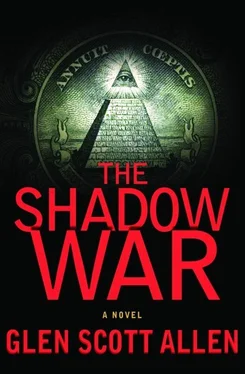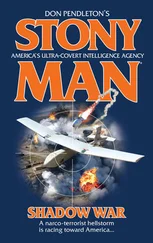Glen Allen - The shadow war
Здесь есть возможность читать онлайн «Glen Allen - The shadow war» весь текст электронной книги совершенно бесплатно (целиком полную версию без сокращений). В некоторых случаях можно слушать аудио, скачать через торрент в формате fb2 и присутствует краткое содержание. Жанр: Триллер, на английском языке. Описание произведения, (предисловие) а так же отзывы посетителей доступны на портале библиотеки ЛибКат.
- Название:The shadow war
- Автор:
- Жанр:
- Год:неизвестен
- ISBN:нет данных
- Рейтинг книги:5 / 5. Голосов: 1
-
Избранное:Добавить в избранное
- Отзывы:
-
Ваша оценка:
- 100
- 1
- 2
- 3
- 4
- 5
The shadow war: краткое содержание, описание и аннотация
Предлагаем к чтению аннотацию, описание, краткое содержание или предисловие (зависит от того, что написал сам автор книги «The shadow war»). Если вы не нашли необходимую информацию о книге — напишите в комментариях, мы постараемся отыскать её.
The shadow war — читать онлайн бесплатно полную книгу (весь текст) целиком
Ниже представлен текст книги, разбитый по страницам. Система сохранения места последней прочитанной страницы, позволяет с удобством читать онлайн бесплатно книгу «The shadow war», без необходимости каждый раз заново искать на чём Вы остановились. Поставьте закладку, и сможете в любой момент перейти на страницу, на которой закончили чтение.
Интервал:
Закладка:
"Do you mind," he said, "if I ask what I'm eating?"
"Only thing in Boris's freezer," Nikolai said. "Bear meat. Very good, yes?"
Benjamin smiled, dug in.
"As charming as this repast is," interjected Wolfe, "we need to be finishing and getting to town. I want a doctor to see Benjamin, and Boris for that matter. And we need to let Kalinin know what's happened… In fact, I'm surprised he hasn't sent someone out here." He glanced somewhat nervously out into the dark night.
"The phone?" asked Benjamin, wolfing down more of the stew.
"Out of order," said Nikolai.
"Well, as long as we do have a few minutes, would someone mind explaining to me what Stzenariy or Analiz 55 really is, and what it has to do with all this?"
"First understand this," said Wolfe. "At that time, in the early sixties, American theoreticians like Leverotov working at American versions of 12 Directorate were coming to the same realization he had. They could read the same probabilities and knew one of two things was inevitable: nuclear war, or one side gives up. But this third alternative of Leverotov's, the Nash equilibrium… well, apparently they weren't as audacious, or as brilliant, as him. I've read all the literature of the time; there's no mention of it from the American side. At least not publically."
"Sam," Benjamin said, showing his fatigue, "I've been shot, I'm full of drugs and vodka, and now I know how to use a gun. As Anton said, could you stop being coy?"
Wolfe laughed out loud. "Sorry," he apologized. "Professional habit. But Anton should tell this part." He motioned for Anton to continue.
"What I hear is only stories, later," said Anton, sitting back for a moment from his meal. "Rumors KGB had fooled Americans by leaking some fake plan for atomic war strategy." Now Anton looked coy.
Benjamin thought for a moment. "Not Scenario 55, by any chance."
"Hah!" Anton slapped his knee, turned to Wolfe. "You were right, bright boy."
"So we did know what Scenario 55 was, clear back in the sixties?"
"No, not really," said Wolfe. "You see, apparently the KGB leaked the plan on purpose, as disinformation, to confuse us. But it had a quite unintended effect.
"Anton showed you how Fletcher had coded Myorkin's letter into octal, then made an image of it?" Wolfe continued, and Benjamin nodded. "But Anton hadn't decoded all of it yet when he talked to you. He did, later. Myorkin wrote that he'd found something else in the St. Petersburg archives, something that seemed strange to him to be in such secret archives because there didn't seem anything secret about it."
"And that something was?"
"Visa applications," said Anton. "For bunch of American academics. To come to Moscow. And then, by train, to Kuntsevo."
Why did that name sound familiar? thought Benjamin. "I'm sorry, I don't…"
"Where 12 Directorate was," said Anton, "in 1965."
"Damn strange," Nikolai interjected, "letting Americans come to Kuntsevo back then."
"I can see that," said Benjamin. "But why did Myorkin think it had anything to do with Jeremy's research?"
There was a general pause, and Benjamin could tell a bomb was about to drop. And finally it fell to Wolfe to drop it.
"Because one of the names on that visa list was Fletcher's current boss," said Wolfe steadily. "One Arthur Terrill."
"Arthur?!" Benjamin couldn't imagine the slight, precisely mannered academic involved in Cold War intrigue. "But… why him?"
"Is obvious," said Anton. "American guys, 12 Directorate guys get together. Everybody says, Cuba too damn close. One little slip, boom, everybody lose. You want to keep power, we want to keep power. How do we do that? How do we get to Nash equilibrium without blowing everybody up?"
Benjamin realized Anton wasn't asking a rhetorical question, but he didn't have the answer.
"How?" he asked.
"Fake it," Anton said. He took another bite of stew.
Benjamin looked at Anton, then at Wolfe.
"Fake it?" he said.
"Make it so you can't destroy us, we can't destroy you," said Anton. "Everything stable. But public need enemies. Need almost war." He looked at Benjamin steadily, as though willing him to understand what he was about to say. "Need cold war."
Benjamin waited for someone to say something else. But no one did.
"Are you saying…" Benjamin shook his head to clear it, then realized it wasn't the fog of drugs or alcohol. "Are you saying the Cold War was a sham?"
"Borba s tenyu," Anton said, nodding. "Shadow boxing."
"Only with nuclear gloves," added Wolfe. "And how appropriate. Their nickname for this new scenario, for Stzenariy 55, was Borba s tenyu. The Shadow War."
For a moment, Benjamin couldn't speak. Finally he said, "That's… impossible. There would have to be… well, thousands of people involved."
"Not at all," said Wolfe. "Just a few. The right few."
"In Soviet Union," Anton said, "maybe twenty people in 12 Directorate know nuclear war plan. They give orders, everybody else just follow orders."
"And the American plan," said Wolfe, "SIOP… well, it's so complicated, there aren't many more than a dozen people who even understand it. It's all under the control of STRATCOM. Not even the president can change it. He just gives the go-ahead. Everything else is automatic. It's a conspiracy he doesn't need to know he's part of," finished Wolfe, raising and draining his glass.
"But…" Benjamin thought of something. "But the missiles are real. The bombs are real."
"Ah," said Wolfe. "That returns us to Comrade Leverotov's journal." He pulled the journal over, pushed it toward Benjamin. "See those columns of numbers?"
Benjamin looked at them. They meant nothing to him.
"So what?" he said. For some reason, he was feeling defiant, angry. He realized deep down he didn't want what they were telling him to be true.
Now it was Nikolai's turn to speak. "Remember, I told you about Czech crisis, about drill where things don't make sense?" Benjamin nodded. "Well, arming codes and targeting protocol before Cuba was in missiles. But after Cuba, arming codes and targets come from Moscow. From 12 Directorate. But in drill, red light tells us these codes transmitted. System thought missiles were launched, so sent codes."
"So?" said Benjamin, still defiant.
"Leverotov was an engineer," said Wolfe. "An exceptionally talented one. He knew the missiles would store these codes until they were given new ones. So he decided to check one missile, find out just what those codes had been. And he knew how to translate them. But what he discovered, he simply didn't believe."
"And what did he discover?" asked Benjamin.
"The missile had never been armed. And its target was a spot north of the Arctic Circle. But nothing was there. No NATO base, no submarine patrol zones. Nothing. So he checked another missile. Same thing. And another missile. Same thing." Wolfe pulled the journal back, closed it. "Over the next month, he checked over half the missiles of Uzhur-4. And what he found was that every single one of them, if they'd blasted off, would have been sent straight to the emptiness of the North Pole, there to punch a hole in the ice and sink to the bottom of the ocean like so much scrap metal."
"And," added Nikolai, "if mistake, each missile can be destroyed, poof, in the air. From Moscow. From guys in 12 Directorate."
"You have to admit," Wolfe said with grudging respect, "it was brilliant. No outward sign the weapons had been tampered with, and if the 'arrangement' ever collapsed, simply enter real codes, and voila. Real MADness."
"I would guess I maybe know two of those 'brilliant' 12 Directorate guys," added Anton. "Dmitri Korsilov and Vladimir Potyminken. Old hands by time I came. Now, who knows where they are-or who they are friends with?"
Benjamin found himself struggling to take it all in.
Читать дальшеИнтервал:
Закладка:
Похожие книги на «The shadow war»
Представляем Вашему вниманию похожие книги на «The shadow war» списком для выбора. Мы отобрали схожую по названию и смыслу литературу в надежде предоставить читателям больше вариантов отыскать новые, интересные, ещё непрочитанные произведения.
Обсуждение, отзывы о книге «The shadow war» и просто собственные мнения читателей. Оставьте ваши комментарии, напишите, что Вы думаете о произведении, его смысле или главных героях. Укажите что конкретно понравилось, а что нет, и почему Вы так считаете.












